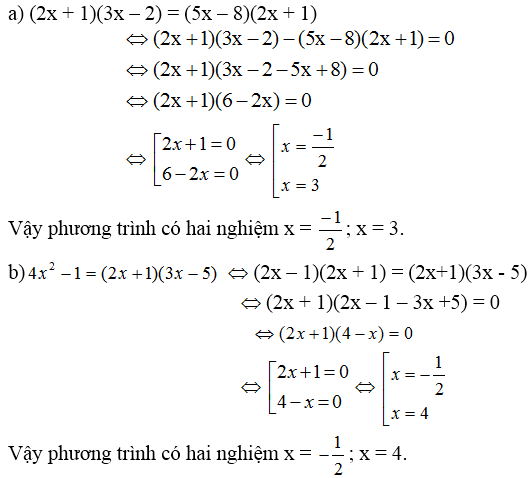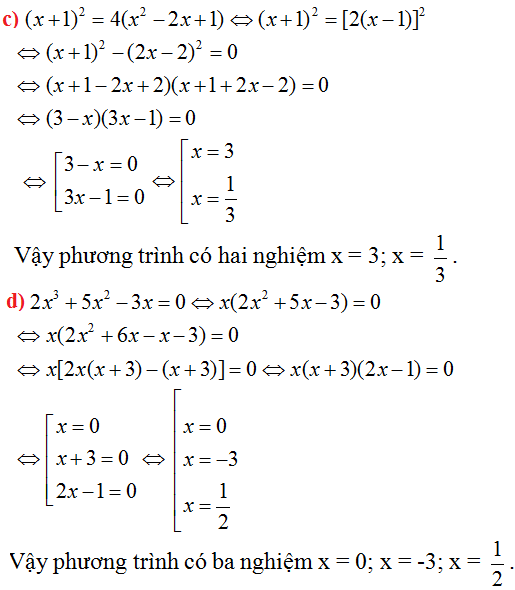Hãy nhập câu hỏi của bạn vào đây, nếu là tài khoản VIP, bạn sẽ được ưu tiên trả lời.

chẳng ai giải, thôi mình giải vậy!
a) Đặt \(y=x^2+4x+8\),phương trình có dạng:
\(t^2+3x\cdot t+2x^2=0\)
\(\Leftrightarrow t^2+xt+2xt+2x^2=0\)
\(\Leftrightarrow t\left(t+x\right)+2x\left(t+x\right)=0\)
\(\Leftrightarrow\left(2x+t\right)\left(t+x\right)=0\)
\(\Leftrightarrow\left(2x+x^2+4x+8\right)\left(x^2+4x+8+x\right)=0\)
\(\Leftrightarrow\orbr{\begin{cases}x=-2\\x=-4\end{cases}}\)vậy tập nghiệm của phương trình là:S={-2;-4}
b) nhân 2 vế của phương trình với 12 ta được:
\(\left(6x+7\right)^2\left(6x+8\right)\left(6x+6\right)=72\)
Đặt y=6x+7, ta được:\(y^2\left(y+1\right)\left(y-1\right)=72\)
giải tiếp ra ta sẽ được S={-2/3;-5/3}
c) \(\left(x-2\right)^4+\left(x-6\right)^4=82\)
S={3;5}
d)s={1}
e) S={1;-2;-1/2}
f) phương trình vô nghiệm

a) 2x(x-3)+5(x-3)=0
\(\Leftrightarrow\left(x-3\right)\left(2x+5\right)=0\)
\(\Leftrightarrow\left[{}\begin{matrix}x-3=0\\2x+5=0\end{matrix}\right.\)
\(\Leftrightarrow\left[{}\begin{matrix}x=3\\x=-\frac{5}{2}\end{matrix}\right.\)
Vậy: phương trình đã cho có tập nghiệm S=\(\left\{3;-\frac{5}{2}\right\}\)

Bài 3:
a) \(\left(x-6\right).\left(2x-5\right).\left(3x+9\right)=0\)
\(\Leftrightarrow\left(x-6\right).\left(2x-5\right).3.\left(x+3\right)=0\)
Vì \(3\ne0.\)
\(\Leftrightarrow\left[{}\begin{matrix}x-6=0\\2x-5=0\\x+3=0\end{matrix}\right.\Leftrightarrow\left[{}\begin{matrix}x=6\\2x=5\\x=-3\end{matrix}\right.\Leftrightarrow\left[{}\begin{matrix}x=6\\x=\frac{5}{2}\\x=-3\end{matrix}\right.\)
Vậy phương trình có tập hợp nghiệm là: \(S=\left\{6;\frac{5}{2};-3\right\}.\)
b) \(2x.\left(x-3\right)+5.\left(x-3\right)=0\)
\(\Leftrightarrow\left(x-3\right).\left(2x+5\right)=0\)
\(\Leftrightarrow\left[{}\begin{matrix}x-3=0\\2x+5=0\end{matrix}\right.\Leftrightarrow\left[{}\begin{matrix}x=3\\2x=-5\end{matrix}\right.\Leftrightarrow\left[{}\begin{matrix}x=3\\x=-\frac{5}{2}\end{matrix}\right.\)
Vậy phương trình có tập hợp nghiệm là: \(S=\left\{3;-\frac{5}{2}\right\}.\)
c) \(\left(x^2-4\right)-\left(x-2\right).\left(3-2x\right)=0\)
\(\Leftrightarrow\left(x^2-2^2\right)-\left(x-2\right).\left(3-2x\right)=0\)
\(\Leftrightarrow\left(x-2\right).\left(x+2\right)-\left(x-2\right).\left(3-2x\right)=0\)
\(\Leftrightarrow\left(x-2\right).\left(x+2-3+2x\right)=0\)
\(\Leftrightarrow\left(x-2\right).\left(3x-1\right)=0\)
\(\Leftrightarrow\left[{}\begin{matrix}x-2=0\\3x-1=0\end{matrix}\right.\Leftrightarrow\left[{}\begin{matrix}x=2\\3x=1\end{matrix}\right.\Leftrightarrow\left[{}\begin{matrix}x=2\\x=\frac{1}{3}\end{matrix}\right.\)
Vậy phương trình có tập hợp nghiệm là: \(S=\left\{2;\frac{1}{3}\right\}.\)
Chúc bạn học tốt!

a)(2x+1)(3x-2)=(5x-8)(2x+1)
⇔(2x+1)(3x-2)-(5x-8)(2x+1)=0
⇔(2x+1)(3x-2-5x+8)=0
⇔(2x+1)(-2x+6)=0
⇔2x+1=0 hoặc -2x+6=0
1.2x+1=0⇔2x=-1⇔x=-1/2
2.-2x+6=0⇔-2x=-6⇔x=3
phương trình có 2 nghiệm x=-1/2 và x=3

a) đặt \(\left(x^2+x\right)\)là \(y\)
ta có: \(3y^2-7y+4\)\(=0\)
<=>\(\left(3y-4\right)\left(y-1\right)=0\)
còn lại bạn tự xử nhé

a: \(\Leftrightarrow x^2\left(x^2+x-12\right)=0\)
\(\Leftrightarrow x^2\left(x+4\right)\left(x-3\right)=0\)
hay \(x\in\left\{0;-4;3\right\}\)
d: \(\left(x^2+5x\right)^2-2\left(x^2+5x\right)-24=0\)
\(\Leftrightarrow\left(x^2+5x-6\right)\left(x^2+5x+4\right)=0\)
\(\Leftrightarrow\left(x+6\right)\left(x-1\right)\left(x+1\right)\left(x+4\right)=0\)
hay \(x\in\left\{-6;1;-1;-4\right\}\)
f: \(x\left(x+1\right)\left(x-1\right)\left(x+2\right)=24\)
\(\Leftrightarrow\left(x^2+x\right)\left(x^2+x-2\right)=24\)
\(\Leftrightarrow\left(x^2+x\right)^2-2\left(x^2+x\right)-24=0\)
\(\Leftrightarrow x^2+x-6=0\)
\(\Leftrightarrow\left(x+3\right)\left(x-2\right)=0\)
hay \(x\in\left\{-3;2\right\}\)

(x2 + x + 1)(6 - 2x) = 0
<=> 6 - 2x = 0 (do x2 + x + 1 > 0)
<=> 2x = 6
<=> x = 3
Vậy S = {3}
(8x - 4)(x2 + 2x + 2) = 0
<=> 8x - 4 = 0 (vì x2 + 2x + 2 > 0)
<=> 8x = 4
<=> x = 1/2
Vậy S = {1/2}
x3 - 7x + 6 = 0
<=> x3 - x - 6x + 6 = 0
<=> x(x2 - 1) - 6(x - 1) = 0
<=> x(x - 1)(x + 1) - 6(x - 1) = 0
<=> (x2 + x - 6)(x - 1) = 0
<=> (x2 + 3x - 2x - 6)(x - 1) = 0
<=> (x + 3)(x - 2)(x - 1) = 0
<=> x + 3 = 0
hoặc x - 2 = 0
hoặc x - 1 = 0
<=> x = -3
hoặc x = 2
hoặc x = 1
Vậy S = {-3; 1; 2}
x5 - 5x3 + 4x = 0
<=> x(x4 - 5x2 + 4) = 0
<=> x(x4 - x2 - 4x2 + 4) = 0
<=> x[x2(x2 - 1) - 4(x2 - 1)] = 0
<=> x(x - 2)(x + 2)(x - 1)(x + 1) = 0
<=> x = 0 hoặc x - 2 = 0 hoặc x + 2 = 0 hoặc x - 1 = 0 hoặc x + 1 = 0
<=> x = 0 hoặc x = 2 hoặc x = -2 hoặc x = 1 hoặc x = -1
Vậy S = {-2; -1; 0; 1; 2}
+ Ta có: \(\left(x^2+x+1\right).\left(6-2x\right)=0\)
- Ta lại có: \(x^2+x+1=\left(x^2+x+\frac{1}{4}\right)+\frac{3}{4}=\left(x+\frac{1}{2}\right)^2+\frac{3}{4}\ge\frac{3}{4}>0\forall x\)
- Vì \(x^2+x+1>0\forall x\)mà \(\left(x^2+x+1\right).\left(6-2x\right)=0\)
\(\Rightarrow6-2x=0\Leftrightarrow-2x=-6\Leftrightarrow x=3\left(TM\right)\)
Vậy \(S=\left\{3\right\}\)
+ Ta có: \(\left(8x-4\right).\left(x^2+2x+2\right)=0\)
- Ta lại có: \(x^2+2x+2=\left(x^2+2x+1\right)+1=\left(x+1\right)^2+1\ge1>0\forall x\)
- Vì \(x^2+2x+2>0\forall x\)mà \(\left(8x-4\right).\left(x^2+2x+2\right)=0\)
\(\Rightarrow8x-4=0\Leftrightarrow8x=4\Leftrightarrow x=\frac{1}{2}\left(TM\right)\)
Vậy \(S=\left\{\frac{1}{2}\right\}\)
+ Ta có: \(x^3-7x+6=0\)
\(\Leftrightarrow\left(x^3-x^2\right)+\left(x^2-x\right)+\left(6x-6\right)=0\)
\(\Leftrightarrow\left(x-1\right).\left(x^2+x-6\right)=0\)
\(\Leftrightarrow\left(x-1\right).\left[\left(x^2-2x\right)+\left(3x-6\right)\right]=0\)
\(\Leftrightarrow\left(x-1\right).\left(x-2\right).\left(x+3\right)=0\)
Vậy \(S=\left\{-3;1;2\right\}\)
+ Ta có: \(x^5-5x^3+4x=0\)
\(\Leftrightarrow x.\left[\left(x^4-x^2\right)-\left(4x^2-4\right)\right]=0\)
\(\Leftrightarrow x.\left[x^2.\left(x^2-1\right)-4.\left(x^2-1\right)\right]=0\)
\(\Leftrightarrow x.\left(x^2-1\right).\left(x^2-4\right)=0\)
\(\Leftrightarrow x=0\left(TM\right)\)
hoặc \(x^2-1=0\Leftrightarrow x^2=1\Leftrightarrow x=\pm1\left(TM\right)\)
hoặc \(x^2-4=0\Leftrightarrow x^2=4\Leftrightarrow x=\pm2\left(TM\right)\)
Vậy \(S=\left\{-2;-1;0;1;2\right\}\)
!!@@# ^_^ Chúc bạn hok tốt ^_^#@@!!

(1) cho A = 4,25 x(b + 41,53 ) - 125. tim b de A co gia tri =300 . (2)







